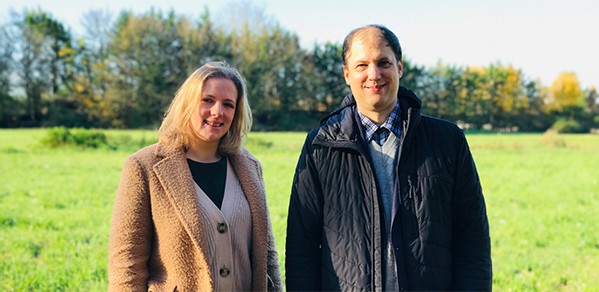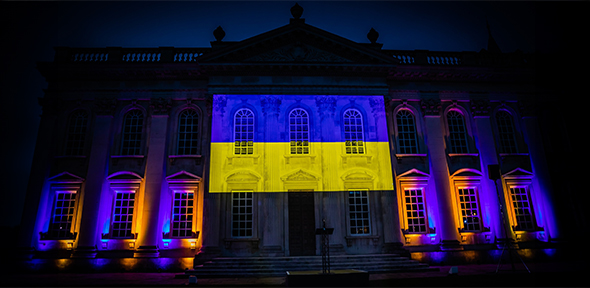
Two displaced scholars from Ukraine will continue their research in the Department of Engineering for a second year, as part of the ‘Cambridge University Help for Ukraine’ programme. Professor Andrii Kondratiev and Dr Valentyna Shkuro are visiting research fellows in the Biomechanics Research Group and Engineering Design Centre respectively.
I would like to express my profound gratitude. You did not just open the doors of your university to us – you opened your hearts to everyone who wants to work in a united Europe.
Professor Andrii Kondratiev
The programme provides funding for up to 26 postgraduate research students and academics from Ukraine, irrespective of nationality, displaced by Russia’s invasion. The programme enables them to continue their studies and research in Cambridge. The University’s support has also included a partnership with Kharkiv University to provide clinical placements for medical students and help for academics still working in Ukraine.
Professor Kondratiev (O.M. Beketov National University of Urban Economy, in Kharkiv) and Dr Shkuro (Taras Shevchenko National University of Kyiv) have spent one year at Cambridge on a fully funded residential placement, and this has since been extended for another year. They recently joined their displaced scholar peers for an extraordinary interdisciplinary conference, held to showcase new research from across the Ukrainian Cambridge community, ranging from engineering and computer science to philosophy, history, ecology and more.
Professor Kondratiev’s current research, in cooperation with Professor Michael Sutcliffe, is to do with the development of restorative structures such as implants, which are tailored to the individual. For the purpose of this research, the individuals mentioned refer to Ukrainian soldiers who have suffered serious injury as a result of the ongoing war, experiencing lost tissue function in the face, neck, scalp and cranium, as well as damage to dental arches.
Professor Kondratiev aims to boost surgical treatment of these severe injuries through reconstruction and recovery of lost tissue function, as well as the restoration of dental arches lost as a result of injury. His method, using computer-aided design, creates various restorative structures adapted to the patient's bone tissues to inform prostheses and implants, taking into account the necessity of individual anatomy considerations.
“The essence of the problem of patient-specific restorative structure is the need to create a favourable stress-strain state in the adjacent bone, as well as in the structure itself,” said Professor Kondratiev. “Therefore, studying the mechanical interaction of a restorative structure, for example, a dental implant as the main supporting element of dental prosthesis, is a primary scientific and engineering task.”
He added: “The aim is to develop methods of designing digital models of lost anatomical sites, as well as the establishment of the dominant biomechanical factors influencing the shape of the restorative structure and selection of its parameters. This will allow us to study biomechanical conditions of successful osseointegration – a type of implant, splint, plate or screw, which is permanently connected to the adjacent bone tissue. The bone then grows into the implant.
“Analysis of stress and strain fields in restored bone tissues and restorative structures is carried out using methods and algorithms of finite element analysis and computer modelling developed in the aerospace industry. To evaluate treatment prospects, the theories of mechanical limiting stress state developed for aviation anisotropic composite materials, and the corresponding theories of strength, are applicable. They allow us to evaluate the functional strength of any individual’s bone tissues, which are, in fact, modelled as anisotropic solids.”
Dr Shkuro’s current research, in cooperation with Professor John Clarkson and Dr Sam Waller, is to do with gaining a better understanding of the needs of people who use prostheses in an inclusive built environment. The focus is on the rebuilding and post-war development of Ukraine, ensuring that inclusivity and accessibility is discussed at the planning stage.
“According to the Ministry of Social Policy of Ukraine, during the full-scale war, 300,000 people became disabled. Now there are three million people with disabilities in Ukraine,” said Dr Shkuro. “Increasing numbers of veterans who have served our country and returned to cities are excluded from buildings and spaces that were designed and built to be inaccessible.”
She added: “Achieving inclusivity and accessibility at the planning stage requires methods to collect data about users, and tools to represent those users for planning decisions. This is what my research is all about. Currently, I have conducted surveys of people in Ukraine, primarily veterans, who are using leg prosthetics, as well as surveys of the professionals providing rehabilitation services, including physiotherapists, psychologists and social workers. In the future, we plan to cover a larger number of respondents, including those with hand prosthetics and those with more than one year’s worth of experience using prosthetics.
“Evaluating the built environment according to people's holistic needs requires more than a list of boxes to tick. Understanding people's goals within the building, the factors affecting time, and the perceived experience is essential. It is also important to understand the impact of war and stress factors on people's perception of design and the architectural environment.”

Credit: University of Cambridge.
We asked Andrii and Valentyna: How has your Cambridge experience been so far?
Andrii: To be honest, I always wanted to try my hand at working in a group such as the Biomechanics Group at Cambridge, but I never thought that I would get the chance to become a part of it! The team environment inspires me. I have the opportunity to imagine, create and implement my ideas. I'm lucky. Plus, I would like to say a special thank you to Professor Michael Sutcliffe with whom I was fortunate to conduct this research. I am proud to be a part of such a great team and am confident that our cooperation will bring even greater results in the future.
Valentyna: It is an inspiring experience. The opportunity to work with the Inclusive Design Group at Cambridge has provided me with invaluable insights and a chance to acquire new knowledge in the field. Throughout this collaboration, I have had the opportunity to reassess various professional perspectives and directions in my work. This experience has significantly broadened my understanding of inclusion and introduced me to a diverse set of tools that can facilitate its effective implementation.
I extend my profound gratitude to my supervisors for generously sharing their time and knowledge with me, enhancing my professional growth. Moreover, I have the privilege of working with an exceptionally friendly, empathetic and highly skilled team at the Engineering Design Centre. The collaborative and supportive environment has contributed to a positive and enriching experience, making my time here both rewarding and fulfilling.
What are your thoughts on the Cambridge University Help for Ukraine programme?
Andrii: This research would not have been possible without the exceptional support of the University of Cambridge and the members of the University of Cambridge’s Help for Ukraine programme. I would like to express my profound gratitude. You did not just open the doors of your university to us – you opened your hearts to everyone who wants to work in a united Europe.
Valentyna: My impressions of the Cambridge University Help for Ukraine programme are overwhelmingly positive. The scheme provides a unique and invaluable opportunity for researchers and scholars from Ukraine to continue their ongoing research within a secure environment. It not only facilitates their integration into the global scientific community, but also contributes significantly to the investment and strengthening of Ukrainian science, playing a pivotal role in the post-war reconstruction efforts in Ukraine.
I wish to express my sincere appreciation to the University administration, the entire academic community and the faculties that advocated for the creation of this scheme. Their commitment serves as a significant signal of support and unity, especially during these challenging times.
Looking ahead to your second year here with us, what are your hopes and goals for the future?
Andrii: I want to appreciate every day spent here. I am convinced that having gained experience in the scientific circles of the University of Cambridge, I will be able to bring great benefit to my Motherland in achieving our goals of post-war reconstruction.
Valentyna: I want to express my heartfelt appreciation for the chance to continue my academic journey at the University for another year. As for my plans in the coming year, I aim to actively broaden and intensify my research by involving a larger number of respondents. I am genuinely proud and grateful for the opportunity to be a part of this community.
---
About Professor Kondratiev
Andrii Kondratiev is a Professor of the Department of Materials Science and Engineering of Composite Structures, O.M. Beketov National University of Urban Economy in Kharkiv. His scientific and teaching activities are aimed at the development of the contemporary technologies and materials for mechanical engineering and infrastructure. His notable achievements include but are not limited to: A laureate of the President of Ukraine Award for young scientists; A laureate of the Parliament of Ukraine Award; A laureate of the Ukraine Scientist of the Year Award; A laureate of the Ukraine Young Scientist 2021 competition; A three-time scholarship holder of the Cabinet of Ministers of Ukraine for young scientists; and a three-time scholarship holder of Parliament of Ukraine for young scientists.
About Dr Shkuro
Valentyna Shkuro has a PhD in Psychology and is an Assistant Professor in the Department of Social Rehabilitation and Social Pedagogics, Taras Shevchenko National University of Kyiv. Her research goal is to create user prototypes; a persona for individuals using prosthetics, alongside formulating recommendations for fostering an inclusive architectural environment. She aspires to share her findings through publications and conference participation, thereby contributing to the dissemination of valuable experiences and promoting inclusivity. She also intends to present the findings and results to representatives of civil society and government authorities.

